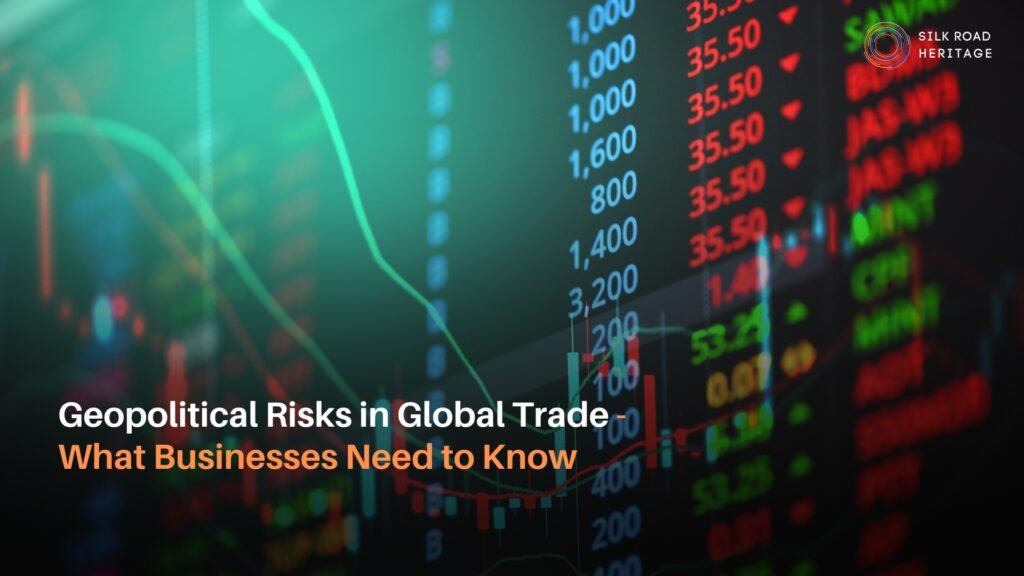Geopolitical Risks in Global Trade: What Businesses Need to Know

4/18/2025
The landscape of global trade has never been more uncertain. From escalating trade wars to sudden regulatory shifts, businesses operating across borders are facing a level of unpredictability that threatens both short-term profitability and long-term stability. Commodity firms, in particular, are feeling the pressure as geopolitical risks impact everything from supply chains to financial transactions. During a recent panel discussion with CFOs of leading commodity trading firms, a clear consensus emerged: geopolitical risks are no longer just an external factor—they are now an operational reality that must be actively managed. Businesses that fail to prepare for these disruptions risk being blindsided by regulatory changes, market volatility, and even financial restrictions imposed by international sanctions.
Trade Wars and Economic Policies: A New Normal
Over the past decade, the global economy has shifted from an era of multilateral cooperation to one defined by protectionism and economic nationalism. The U.S.-China trade war, sanctions on Russian energy exports, and ongoing tensions between Western economies and emerging markets have created a fractured trade environment where tariffs and regulatory barriers can change overnight.
One panelist noted that businesses can no longer assume stability in trade agreements. “We wake up every morning to new policy announcements that have the potential to shift entire supply chains. It’s no longer about planning five years ahead—it’s about being agile enough to react in real time.” This sentiment was echoed by multiple CFOs, who stressed that businesses must now account for trade disruptions as a standard part of risk management.
Beyond trade wars, shifting economic policies are also playing a significant role in shaping global trade dynamics. As governments around the world prioritize domestic industries, subsidies, tax incentives, and regulatory barriers are making certain markets more difficult to navigate. The OECD’s global minimum tax, for instance, has changed how companies structure their global operations, impacting everything from profit margins to investment strategies.
Supply Chain Disruptions and Market Volatility
Geopolitical tensions have exposed the vulnerabilities of modern supply chains. The COVID-19 pandemic, followed by the war in Ukraine, disrupted energy supplies, raw materials, and shipping routes—leading to inflationary pressures and shortages across multiple industries. More recently, the Red Sea shipping crisis, driven by geopolitical instability in the Middle East, has forced businesses to rethink their reliance on key maritime routes.
One CFO at the panel discussion highlighted a fundamental shift in supply chain strategy: “The just-in-time model is dead. We are now in an era of just-in-case supply chains, where businesses must build buffers, diversify sourcing, and invest in alternative logistics routes.”
Many firms are now regionalizing supply chains, reducing dependence on a single country or supplier. This shift is particularly evident in sectors like energy and metals, where trade restrictions have made it difficult to secure critical resources. Some companies are even investing in onshoring and nearshoring, bringing production closer to key markets to reduce exposure to geopolitical risks.
A New Era of Trade: Adapting to the Unpredictable
The global trade environment is shifting faster than ever before. Businesses that fail to recognize the importance of geopolitical risk management will find themselves at the mercy of sudden policy shifts, supply chain disruptions, and financial instability. As one CFO put it during the panel, “Geopolitics is now part of business strategy. It’s not something that happens in the background—it’s something that determines whether or not we can execute deals, access financing, or even move our products across borders.” For companies operating in international markets, the lesson is clear: the ability to navigate geopolitical risks is now a competitive advantage. Businesses that invest in diversification, financial resilience, and strategic foresight will be the ones that thrive in an era of uncertainty.
Silk Road Heritage is a boutique financial and business consulting firm based in the vibrant city of Dubai with branches in Italy and Switzerland.
- 2024 SilkRoadHeritage. All rights reserved.

